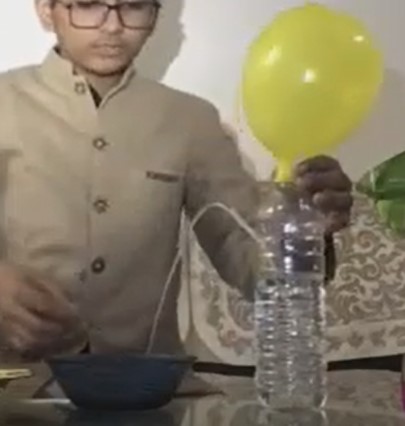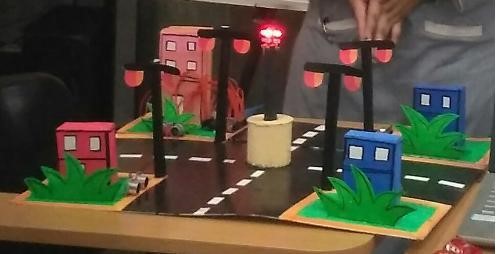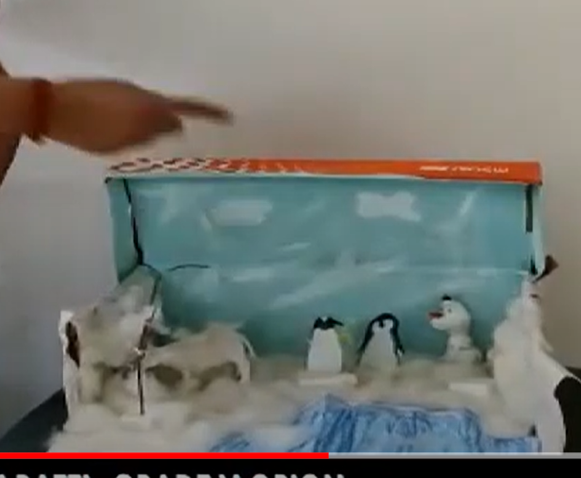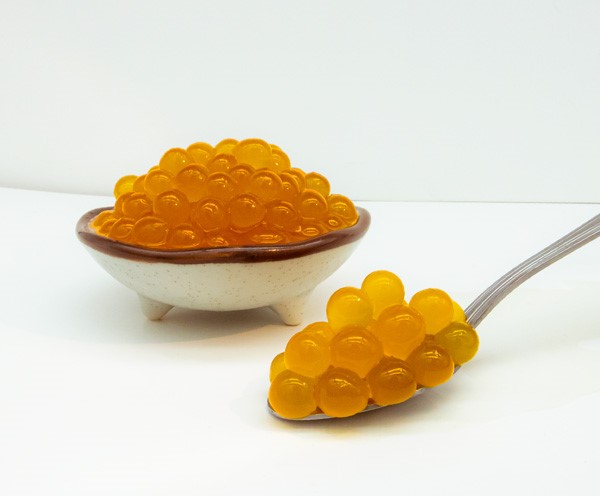1.Water fountain

Description
Water is filled in a bottle and an inflated balloon fixed on the mouth of the bottle. The water is pushed out through the hole made in the bottle as the air from the balloon is pushed into the bottle.
Exhibit Review
| Evaluation parameter | Comments |
|---|---|
| Innovation | A common experiment that is widely used. Nothing new or innovative. |
| Exploration | No exploration |
| Scientific approach | Not demonstrated - no measurements, no data recording, no experimentation with the apparatus |
| Science principle | The principles communicated by the model are common and easy to understand, even without the model |
| Technical skills/ workmanship/ craftsmanship | Not much, just fixing a balloon and making a hole in the bottle |
| Utility | Not much, just fixing a balloon and making a hole in the bottle |
| Economics | Good, simple but durable material used |
2. Density Based Real Time Traffic Management

Description
Install ultrasonic sensors on traffic junctions to detect the presence of vehicles and switch the respective signal accordingly. A model to demonstrate this system using an Arduino board has been created.
Exhibit Review
| Evaluation parameter | Comments |
|---|---|
| Innovation | Usage of available technology, no science or scientific exploration or innovation |
| Exploration | No exploration, could be tested under multiple traffic situations. |
| Scientific approach | Not apparent from the documentation. |
| Science principle | Validation of technologies like sensors and the Aduino microcontroller board. Off the shelf products available are assembled. |
| Technical skills/ workmanship/ craftsmanship | Programming, installation of electronic circuits using sensors are visible |
| Utility | Given the high traffic density in Indian cities during peak hours on all intersecting roads, this problem has negligible repercussions. Some research should have been conducted with Indian traffic departments to understand existing solutions already available and deployed. |
| Economics | City model showing buildings made from plastic are not necessary. |
3. Habitats & Adaptations

Description
Polar bears, arctic foxes, snowy owls, penguins etc. live in the tundra region. Polar bears have black skin, their fur appears white and helps them to blend in snow and ice. It has a layer of fat under its skin, which helps them to stay warm. Penguins are flightless bird; they are excellent swimmers and have streamlined bodies.
Exhibit Review
| Evaluation parameter | Comments |
|---|---|
| Innovation | Nothing new. Static thermocol model, nothing innovative, no scientific exploration. |
| Exploration | No specific exploration undertaken by the student |
| Scientific approach | Not visible |
| Science principle | Not visible |
| Technical skills/ workmanship/ craftsmanship | Craft work with paper, glue and other classroom stationery |
| Utility | None |
| Economics | Materials like thermocol have been used to make a static model which does not have any additional value in explaining the underlying science. |
4. Science of Spherification

Description
Soft drinks and juices can be converted to ball-shaped solids, which have a hard cover on top with the liquid inside. These are called boba balls that pop in your mouth. These balls are often used to decorate food items like deserts and frozen yogurts. The project is about converting juices and drinks to boba balls.
Exhibit Review
| Evaluation parameter | Comments |
|---|---|
| Innovation | Technology demonstration, which has utility in life but no science demonstrated |
| Exploration | None It’s a series of steps that have been used elsewhere that have be replicated. |
| Scientific approach | Not visible |
| Science principle | Known information (process of spherification) being narrated |
| Technical skills/ workmanship/ craftsmanship | Working with liquid and a couple of chemicals, stirring, mixing |
| Utility | Food decoration |
| Economics | Special chemicals required |
